The Village Voice
Smart-ass rocker crafts another #1 Record
Every aspiring guitarist who taped a copy of Big Star’s Radio City went on to start his own band. That’s conventional wisdom, but what about the misfits who scrounged a burn of Alex Chilton’s Like Flies on Sherbert or treasured a bootleg LP of his late-‘70s Elektra demos? On Soap and Water, former Green on Red guitarist Chuck Prophet answers that question. It’s a catchy, accurate recasting of Chilton’s terrified insouciance and sickening pop modulations, and if it occasionally descends into pastiche, it scrubs behind Chilton’s ears with a loving touch. Prophet might not sing as snidely as the Memphian did on such numbers as Sherbert’s “Hey! Little Child” (referenced here on “Heart Beat”), but he adds complaisant female vocals to an ingenious series of mocking guitar moves.
“Down Time” rocks along in the jaunty manner of the Sir Douglas Quintet’s “She’s About a Mover” and fades before it has time to gather momentum. Intelligent enough to take pleasure in the basics but too impatient to stick with anything for very long, Prophet sounds like the kind of smart-ass who doesn’t worry about earning your respect. This means he gets away with lines like “The women threw their panties/And the women threw their bras/Elvis hung his head/And said, ‘They’ll forget me when I’m gone.’ ” He affects wisdom on “Small Town,” a gorgeous meditation on big-city temptations-specifically, Prophet doesn’t want anyone to mess with his sister, who leaves town with only “a Realistic stereo and a phone that doesn’t ring” for evidence. Best of all is the title track, a two-chord stomp that finds Prophet trafficking in the cheap oppositions big brother Alex perfected 30 years ago. “Dry hump/Wet nurse/Loose change/Tight purse,” he sings, sounding like a man who wears clean underwear but is scared to change his dirty socks.
by
Edd Hurt
on
February 9, 2007
The Walsh Files
Chuck Prophet: “Nearer To You,” Betty Harris. “From the aptly titled collection Soul Perfection. Or was it, Soul Imperfection? Greasy and Funky? You bet. Dramatic, too. Betty Harris sang with unbridled desire—she ate the mic and chewed right through the tape with her white hot yearning. She sang like she had a capo around her throat, milking just a few words, wringing ‘em out—as if she doesn’t need words at all. Betty feeds you and leaves you hungry for more. And with the Meters backing her up, (particularly Leo Nocentelli playing the bent guitar fills around her pleas for love), those singles she cut in the 60’s with Bert Berns and later with Alan Toussaint were pure unrequited, untamed, longing at it’s best. It doesn’t get any more heart-wrenching than “Nearer to You.” Like a mystery I could never solve—I’ll just have to keep listening.
by
Jim Walsh
on
January 31, 2007
Winston-Salem Journal
Singer and songwriter Chuck Prophet has been ahead of the curve since his days with the devilishly cagey Green On Red. His latest solo album, the delightful Soap and Water, is another dance away from anything obvious, done so casually that he makes originality seem simple.
Prophet is the ultimate alternative hybridist. He uses rock ‘n’ roll as a foundation, tossing in tricks and treats snipped from all manner of musical genres. Smart arrangements play with cliches - orchestras, children’s choirs - yet somehow remain original, big and sweeping, embellishing the songs instead of overpowering them.
The heart of Soap and Water is Prophet’s skill as lyricist. He is a manipulator of metaphor and novelistic detail, a master at the art of making unease seem soothing through his congenial singing and wry, subtle sense of humor. Understatement has rarely been overstated so well.
by
Ed Bumgardner
on
January 11, 2007
DSD
Imagine if Jeff Tweedy had left Uncle Tupelo and gone on to form a band with Beck, instead of Wilco. That’s kind of what Chuck Prophet sounds like, and it’s really rather good.
Here we have twelve perfectly formed, unashamedly pop songs, ranging from all out alt-country through Blues licks that John Lee would be proud of to pulsating rock and roll, all infused with a sizeable dollop of soul. There are definite parallels with Odelay era Beck in particular, and with Wilco’s earlier material, but there’s plenty here that’s very much Chuck’s own as well.
The sound is fairly stripped back, although the addition of a choir on a few tracks adds a bit more meat. Mostly Chuck’s voice is backed by a mournfully wailing guitar and a funky drum beat, but it’s his voice that takes centre stage.
This album is really good. That’s all there is to it, really. It’s perfect music for sitting round with friends, maybe on the porch, maybe in the car. It’s got soul, and it’s got a lot of heart.
by
Will Slater
on
January 1, 2007
Mix
Chuck Prophet’s seventh album arrives after 12 years as a solo artist, peaking with his 2002 “adult alternative” single, “Summertime Thing.” This go ‘round promises to raise the San Franciscan’s profile even higher, as he raises the bar with a mix of blues (“Automatic Blues”), funk, psychedelic pop (“Age of Miracles”) and country rock.
Prophet’s signature drone tumbles out Lou Reed - ish poetic ramblings on “You Did (Bomp Shooby Dooby Bomp),” while wife Stephanie Finch lays down retro vintage keyboard parts. The combination is wistful, like someone mulling over the events of a long night in the city’s dark watering holes while riding a near-empty late-night bus home. Players hail from Nashville, San Francisco and points between, creating an album that’s crafted, modern and full of fine writing and melody, but not without its roots.
by
Heather Johnson
on
December 31, 2006
Brink
Eddie Hinton Tribute Show
Following the San Francisco screening of “Dangerous Highway”, a truly motley group gathered for a drunken afternoon at Annie’s Social Club on Folsom to pay tribute to the brilliant Eddie Hinton. Eddie, known for his brilliant songwriting, was not well known for his most important endeavour; turning Dan Penn on to acid. There were raffle tickets. Mark Eitzel, in all his glorious agony, won an Eddie Hinton cd. For a brief moment the wellspring of tears ever-present in his angelic eyes dissipated. There was music. Tom Heyman started off the show with some beautiful balladry and was followed by the sensitive Mike Therieau. I was confused. My soul was saved soon after by Mr. Chuck Prophet. Chuck, in all his sweaty rock and roll glory, stepped on stage with his band, threw on his beat up Telecaster and played, yes PLAYED. It was brilliant. He even remarked on stage that when he first heard Alex Chilton he wanted to make it with him. We were thrilled. We were surprised. It rang so true.
by
John Murry
on
December 31, 2006
Harp
Green on Red
Valley Fever: Green on Red Live at The Rialto
(Brink Films)
Just over a year ago, Green on Red, the seminal 1980s Paisley Underground/alt-country/roots rock/whatever band, reconvened at Tucson’s Rialto Theater to celebrate Hotel Congress’ 20th anniversary as well as pay tribute to their fallen drummer, Alex Macnicol. The 16-song set was initially burdened by the band’s don’t-wanna-talk-about-it baggage, but shortly got to cookin’-and soon singer-songwriter-guitarist Dan Stuart’s jokes got better and the four remaining members smiled, sweated and played like it was 1985 all over again. Guitarist Chuck Prophet discussed the event with Harp.
HARP: Shall we speak of Green on Red’s “sloppy brilliance?”
Some people thought we were the saviors of rock ’n’ roll, and a lot of other people thought we were pathetic. I think they were both right.
There is kind of a Wild Bunch element to Green on Red. But there’s safety in numbers. We’re all tight enough to just embrace the sloppiness when it happens, you know. Before we played the show, we went to London and rescheduled a show that was meant to be the last show of our tour, before we basically imploded. We had a huddle backstage and Dan said, “Okay, we’re old. We know what to do.”
HARP: Takes a big man to admit that.
Seriously, there were times when it meandered into brilliance and when it was pathetic.
HARP: Where were you brilliant and where were you pathetic?
Anybody that learned five cowboy chords at Catholic youth camp could probably play any of [Green on Red’s] songs. At the same time, there was something about the collective thing that happened when we all played together. But, you know, to be honest, there’s really not a lot of things I want to revisit from 18 years ago. We had to do the reunion because we all know things about each other that we don’t want anyone to know.
HARP: You’ve been through a lot with these guys.
In the four years that we were really active toward the end, it was like we were running on the same nine-volt battery; things got pretty dim. We were all pretty dispirited and it got pretty unfriendly. But it didn’t take long to stand back and squint and remember the good stuff.
HARP: So will you play the Hotel Congress festival every year?
I think somebody started that rumor, in the “If you book it they will come” spirit, but we don’t wanna revisit that. Even though it had been a short time that we’d all been communicating, it didn’t take long before we started bristling at each other’s emails, I’ll tell you that.
HARP: So-how hard did you have to squint to see the good stuff?
Gee, Dr. Phil, I don’t know. Whatever it is, I guess we’re still workin’ through it. One thing I was thinking about today was how things have changed in the music business. One thing was, when we were touring around, our version of really making it was to have a gas card. And we had a gas card; we could fill up the van. In that way, we made it.
We get along creatively as humans, I think. There’s a certain brotherhood to Green on Red, but I think for the uninitiated, if they were to see us all together, somebody didn’t know us might think, “Gee, those guys don’t seem to like each other very much.”
by
Randy Harward
on
October 31, 2006
City Pages
These are a few of my favorite things about Chuck Prophet’s great new album:
1) It’s called Age of Miracles—despite all evidence to the contrary. 2) Prophet’s goofy vocal homage to Dylan on the bridge of the title track. 3) The outrageously sexy backup vocals of his wife Stephanie Finch. 4) The werewolflike howls that Prophet lets loose at the end of “West Memphis Moon.” 5) Despite being pigeonholed as an alt-country guy, Prophet lays down a soulful little rap at the end of “You’ve Got Me Where You Want Me.” 7) The cheesy glockenspiel flourishes and even cheesier backup vocals on “Just to See You Smile.” 8) And most of all, the final track, “Solid Gold,” a ridiculously schmaltzy and beautiful shout-out to friends and lovers.
by
Paul Demko
on
October 2, 2006
Blog Crits
Valley Fever - Green On Red Live at the Rialto
“Downwardly mobile ambitions” - that’s how writer Fred Mills described the music of Green On Red, the Southwestern band that became an underground sensation in Europe during the eighties. The band was among a handful of progenitors of the eclipsed “desert rock” sound, which blended elements of country with a frenetic, edgy guitar sound a la Neil Young.
Starting in 1980, the band released 11 albums, toured relentlessly, and experienced immense burnout throughout a 12-year career that included its share of lineup changes, business squabbles and drug/alcohol addiction. Singer, guitarist, songwriter Dan Stuart could be the poster child for musicians stuck between cult status and overblown celebrity.
Valley Fever is a serendipitous document of a one-off reunion of the group paying tribute to drummer Alex MacNicol, who died in 2004. Stuart and his mates Chris Cacavas (keyboards), Chuck Prophet (guitar), and Jack Waterson (bass) enlisted the help of some Brazilian tourists with video cameras to film the show. Surprisingly, the film work is first-rate. Instead of the standard shaky-cam shots that more often show the stage lights than the band, the turistas.com cameras capture extraordinary frames of the members that show grudging appreciation of each other and at other times facial expressions that indicate the opening of old wounds from being on stage again.
The focus is on Stuart, Prophet and Waterson as they jam with casual abandon while Cacavas and hired gun Daren Hess on drums are the subjects of two shots while they pound out some spiritually energizing rhythms throughout. As with any film, it’s the small details that really make the characters stand out, and Valley Fever has a number of moments that illuminate us into the group’s dynamic. Among the best are Stuart grabbing and mangling his lyric cheat sheets after each song, and foisting them gently into the audience, as if they were dry tumbleweeds being carried off by a dusty wind.
Musically, the band is brilliant. Green On Red was never known for theatrics or technical precision, instead plying a sloppy, self-deprecating style that heightened the bands’ status as rock anti-heroes. Anyone familiar with the band knows Stuart hates live performances, especially in theatres. Yet, his hatred of performance enhances the lazy attack of guitar chords that solidified his reputation in the first place. Prophet plays against Stuart’s minimalist approach with some shrapnel-spewing lead work accompanied by Waterson’s lively bass. This mélange supporting Stuart’s lachrymose words leads to an exalted concert experience.
While Mills was spot-on about Green On Red’s “downwardly mobile ambitions”, Valley Fever proves why the group surpassed its own expectations on a path littered with eighties bands that never found their potential. While the Rialto concert is a fitting tribute to a fallen comrade, Valley Fever is homage to what Green On Red might have been.
by
Larry Sakin
on
August 23, 2006
Marquee Magazine
Chuck Prophet finds solace in this Age of Miracles
Chuck Prophet is a perverse kind of guy. He’s the type of person who would invite all kinds of people to the same party - in part because he likes them all, but also so that he can see what happens when they all hang out together.
The singer/songwriter, who spent eight years with the psychedelic cosmic cowboys Green on Red - a band that was described as a country-meets-folk-meets too many drugs Americana -is set to release his seventh solo CD and second album for New West Records, Age of Miracles.
True to Prophet’s form the album is a mish-mash of styles, collaborators and conspirators, which for some reason fit together like the pieces of a Tetris puzzle.
“When I catch an inspirational virus, I try to inflict it on my closest conspirators and even come up with a batch of songs. Then assemble a group of talented, intense, fierce, difficult, even perverted people, many of whom I’ve worked with before and a few I’ll probably never work with again, lock ’em in a studio and ... you get the idea,” Prophet said.
While it sounds like a strong formula for success Prophet admitted that producing Age of Miracles actually threw him for a loop several times. “I had a couple of false starts where I had to discard some material because there was some kind of overlap schematically. In some ways I kind of simplified things a lot to embrace the chaos and resist the temptation to fix it. It was just one of those records with false starts. I went this direction, and then went another one, and about three-quarters of the way through I guess I got in a groove,” he said in a recent interview with The Marquee.
Through it all, Prophet has kept two things in the forefront of his mind - one, avoiding singer/songwriter trappings and two, that no matter how hard you try, there’s only so much you can do on one record.
“In Green on Red, we did a lot of fun, character-driven songs, and I think that helps me to avoid a lot of the singer/songwriter trappings, You know, ‘My coffee’s getting cold’ kind of things that I try not to fall into,” he said about the former.
As for the latter, he commented, “My self criticism (once my closest and most reliable friend) gave way to a struggle with my self esteem and mental health. So I took a little break from the record to get some ... ah ... perspective. I found there were some food groups under-represented on the record. So I looked around the couch and pulled out the dusty shoe box of cassettes. At about the same time, I bumped into Eric Feldman (P.J. Harvey, Polyphonic Spree and Captain Beefheart) and I immediately enlisted him to oversee and co-produce. Because even with all the new technology, it’s still impossible to be on both sides of the glass at the same time - Jim Dickinson taught me that.”
by
Brian F Johnson
on
August 3, 2006
Outside Left
Beauty Walks on a Razor’s Edge: GOR at Koko
Green on Red, during their Eighties glory days were said to be part of a movement known a the Paisley Underground. Bands which saile under that flag of convenience tended to be le by sissies or nerds who’d gotten all excited abou The Byrds
Green on Red bore much the same relationship to this scene that William Burroughs did to the Beat Generation. With them, but not of them. Laughing at them, not with them. They knew one another, but there the connection ended.
There was nothing second division or socially acceptable about GoR’s rich stew of sophistication, urban alienation, cultural ambition, or punk rock exuberance. They fitted, more tidily, into that troublesome wave of acts which included The Gun Club, Panther Burns, and Alex Chilton. These people tended to be hugely aware avant gardeists high on, amongst other things, the redemptive powers of rock music as high art.
There ended up being two versions of Green on Red. The original was Chris Cacavas, Chuck Prophet, Jack Waterson, Dan Stuart, and Alex MacNicol. I saw them live at The Buttery in Dublin’s Trinity College; I don’t know if I’ve ever seen anything better. Their 1985 album, Gas Food Lodging, is just one of the dazzling artifacts they created; it conjures up the American landscape of Steinbeck, Charles Willeford, or Horace McCoy. I like its cover artwork which calls to mind Philip K Dick’s The Man in the High Castle.
That band came apart at the seams; sometimes the center cannot hold. A while later, Green on Red Mark 2 (Stuart and Prophet backed up by good session players) showed up in Europe, issued a batch of impressive albums, gigged their way up the greasy pole of the live circuit, and became more popular (in Europe) than the original GoR had ever been. I got to know Chuck and Dan somewhere in the middle of that phase in their lives, when they became the Phil and Don of Bukowski Rock. I also met and talked with Chris Cacavas when he passed through London playing with Russ Tolman.
All three men were significantly poignant examples of gifted musicians stranded in an Eighties world gone wrong. The leader of their particular pack, Dylan, was temporarily knocked out and loaded. U2 were writing the book on a whole new set of (tediously mind-numbing) rock’n’roll ethics and mores. Like old gunfighters in Sam Peckinpah movies, the likes of Green on Red were the last of their type, riding off into a post-nuclear sunset. To use an old Irish phrase, their sort will never come again. Just like the sort that I am myself, and the sort who used to throng their long-ago sweaty smoky gigs, will never come again.
And here they come again. That’s bands for you.
Original drummer MacNicol died last year. Death, especially premature death, concentrates the mind and the psyche. The rest of the original lineup got together for a gig in the States and came to London this January to do a one-off show at the Astoria.
I got offered a blowjob as I made to leave the venue by the side exit down a slimy back alley. ‘No thanks, man, I had one earlier.’ I responded, pretty sharpish. One is always being offered blowjobs in the vicinity of the Astoria. It goes with the territory.
It’d been an emotional night of tunes suffused by a narcotic beauty. The dueling between guitarist Prophet and Cacavas on keyboards – two real master musicians – still seemed to be as fundamentally original a sound as anybody important has ever made. Vocalist Dan Stuart, a patrician writerly figure fronting a strident swaggering swamp of sound, was man enough to wear his heart on his sleeve and to be moved by the whole experience. I was touched by the occasion myself.
Bands reforming is tricky business. The Velvet Underground took a hammer to their pristine reputation when they did a Nineties tour. My own favorite adolescent band recently reunited dreadfully as a bunch of besuited, smiling, and middle-aged bores. The Stones’ restoration started shakily but they ultimately found their feet.
You can always come back but you can’t comeback all the way.
Green on Red have just finished a short tour of Europe involving gigs at festivals and clubs.
They sailed into London to participate in an itinerant festival – Don’t Look Back – which gets classic bands to perform live an entire album deemed by armchair pundits to be their finest. Iggy and the Stooges played Fun House as part of last year’s festivities. This year Green on Red did Gas Food Lodging.
I’m totally opposed to the idea of bands playing a so-called “classic album” live as if rock music has become a preserved-in-aspic art form whose best days are behind it. The concept of the “classic album” is a crock of shit too. You either like a band and you buy every last thing they do and you like the most of it or else you’re just a male bozo who collects stuff and reads monthly rock magazines. The “in-concert album” phenomenon started when that abominable Republican walrus Brian Wilson started touring his allegedly “legendary” Smile masterpiece. Why won’t somebody tie Brian Wilson up in a sack with a few large chunks of concrete inside, and throw the sack into the nearest river?
I don’t much like Koko, where GoR were performing, either. It used to be the faintly ridiculous Camden Palace and now it’s been gussied up to look like the world’s biggest bordello.
Back in the Astoria in January the crowd was mainly fortyish gentlemen in black suits, some of them chomping on cigars while others sported Stetsons. Koko and the Don’t Look Back concept brought in a different element. There were a lot more women, many of them glamorous. Denim was much in evidence.
It looks like Green on Red is going to be around a bit from now on. This is good. Gas Food Lodging doesn’t exist as some slice of cultural nostalgia to be conjured up like a magic trick for self-styled cognoscenti. It’s an album available in the shops now, still as exciting as it was in 1985.
The band’s set finished, like their album did, with the old civil rights hymn, We Shall Overcome. As they played it, a filmic backdrop featured examples of American torture and abuse in Iraq. The song turned into a long, percussive, sonic throb. Its great that this band is around again, helping keep beauty on a razor’s edge.
by
Joe Ambrose
on
June 30, 2006
offthepage
Green on Red - Gas Food Lodging
Green on Red’s Gas Food Lodging was a high point for the band, a lasting document of 80’s post-punk rock, and a precursor to the alt-country movement of the 90s. That’s quite a bit of hyperbole, I know, but this record, first released in 1985, does have staying power. The addition of Chuck Prophet on guitar amped up and roughened up the band’s twang, but just as integral were core members Dan Stuart (vocals, guitar) and Chris Cacavas, whose organ gave the group its signature sound. As the title suggests, this is a road record, equal parts Kerouac and serial killer. It sounds, at times, like Crazy Horse, minus the freak-flag-fly romanticism of Neil Young. The record’s centerpiece is the three song raveup, “Sixteen Ways”/“The Drifter”/“Sea of Cortez,” which ends with Stuart’s primitive, anguished wail crashing against a wall of guitars, keys, and drums. As a bonus, the re-release includes the self titled, 7-track debut, which includes gems like “Hair and Skin.” Now it’s time for a double of Gravity Talks and No Free Lunch, the Mercury release currently available only as an import. Gas Food Lodging, along with records like The Days of Wine and Roses and Rum Sodomy and the Lash, will disabuse you of the notion that 80s rock totally sucked.
by
george pelecanos
on
April 30, 2006
The Times UK
Green on Red
David Sinclair at the Astoria, WC2
Never the most reliable team of performers in their day, Green on Red have nevertheless turned out to be men of their word. Having failed to play a show at the Astoria in May 1987 - the point at which the singer and guitarist Dan Stuart was declared clinically insane and the group fell apart - the group finally returned to honour the booking on Tuesday night. They even played the same set of songs that they were planning to feature 19 years ago.
With so much water having passed under the bridge, Stuart felt obliged to preface the show with a lengthy and often comical monologue at the end of which he apologised for “all this reunion s***”. This was nice, but unnecessary. For if ever there was a band that always conducted its affairs with a cavalier lack of concern for tactical or business considerations, while performing music that came straight from the heart, it was Green on Red.
The band, which originated in Tucson, Arizona, pioneered a heroic brand of Americana music before the term was even coined. They released a succession of brilliant but commercially neglected albums in the 1980s, which fused elements of country, blues and rock, while blazing an erratic trail around the concert halls of Europe. Their shows could either be a display of transcendental genius or a very earthbound shambles.
The core line-up of Stuart, keyboard player Chris Cacavas, bass player Dan Waterson and guitarist Chuck Prophet was joined by Jim Bogios, replacing the original drummer Alex MacNicol, who died last year. Older, wiser and somewhat more wizened they may be, but the years rolled away as they embarked on an opening sequence which included the perennial drinking song Hair of the Dog. Stuart, all gruff snarl and gargoyle eyes, spat out the lyric, while Cacavas leavened the mood with a jaunty honky tonk piano part.
Stuart was an amiable frontman but it was Prophet who stole the show with a succession of elegant, dramatic and tightly scripted guitar solos, most notably during the slow, bluesy Jimmy Boy and the soaring finale of Sea of Cortez.
While the danger and unpredictability that was part of their original appeal had given way to a more seasoned professionalism, it meant that the songs actually sounded better than ever. And when Stuart sang the familiar chorus line, “Time ain’t nothing when you’re young” from his new perspective, there was a genuine surge of affection for these unlikely survivors from another era. Let’s hope it is not so long before their next outing.
by
David Sinclair
on
January 12, 2006
Rockzilla
Chuck Prophet has come a long way from his “paisley underground” years as a lead guitarist for Green On Red with whom he recorded eight albums. Age of Miracles is his seventh solo effort and the musical territory Prophet explores here has, again, widened from the country/rock area he hailed from since his musical beginnings to soul, funk, hip-hop and industrial noise. Prophet as the producer of the album, the main guitar player and the singer and songwriter could not have put his signature down more clearly, but co-producer Eric Drew Feldman (Captain Beefheart, Frank Black, PJ Harvey) has certainly not just been another fiddler on the knobs. He helped to drag Prophet out of a creational and inspirational impasse and added some crucial sounds on his Moog synthesizer on a couple of tracks.
The general mood on Age of Miracles shows a certain gloomy likeness to Static Transmission, the 2003 album of another ex-paisley undergrounder, Steve Wynn (The Dream Syndicate). Both musicians have matured into independent, individualist musicians who almost never do what you expect them to do. With this release, Chuck Prophet continues the path he has chosen with The Hurting Business (2000) and No Other Love (2002), at the same time carefully trying to avoid repeating himself. The outcome is an album that is hard to fall in love with immediately, but that if you continue to play it nevertheless, suddenly seems to creep up behind you and hit you over the head with all its might and nastiness. This effect has a lot to do with the arrangement and the production that are “subliminally mean” rather than straightforward: something evil is hiding under the surface and you can’t smell it right away.
The same is true for the lyrics.
Sometimes I feel so alive/ I wish I was dead, Prophet growls in the opener “Automatic Blues” against a backdrop of blazing horns. There is something terrifying in the air, something that you feel listening to Iggy Pop’s The Idiot or Lou Reed’s Berlin.
Lou Reed’s presence is hovering throughout whole album including the title track, a sluggishly moving song with heavy string arrangement (Jason Borger) and female backing vocals (provided by Prophet’s wife Stephanie Finch):
The night is gonna crush the day
Once it was the other way
We hope that you enjoy your stay
In the age of miracles.
Prophet is accompanied on pedal steel in “The Smallest Man in the World” and it sounds good, but it’s a song with a weird lyrical twist underlined by Feldman’s piano playing that seems to quote from Newman’s “Little People” know what I mean? “Whatever he does, he’s the smallest man in the world” and that is not good news.
“Just to See You Smile” continues in the Lou Reed groove, but this time with an almost Phil Spector-like orchestration complete with booming bass, glockenspiel and a whole girl choir. Prophet immediately wipes the smile off any listener’s face with “West Memphis Moon,” the tragic story of the West Memphis Three, three young men who were convicted for murder of three boys in 1994, one of them sentenced to death, even though the evidence was, to say the least, questionable.
There’s a melancholy country feel about “You’ve Got Me Where you Want Me,” a duet with Stephanie Finch co-written by Kim Richey. Richey also contributed to “Baby Pin a Rose on Me,” which turns out to be about an abusive relationship:
You saw a light
I saw a freight train coming
I tried to tell you he was no damn good
You heard bells, I heard the hammer falling.
He ran you down like I said he would.
“A man’s strength is on the insidebut you better be careful with this stuff,” Prophet warns in “Heavy Duty,” a weird and frightening song (co-written with D. (Dan?) Penn), that sounds like Depeche Mode in their darkest period battling it out with Doug Sahm.
The closer “Solid Gold” (again featuring Stephanie Finch on vocals) is another song reminiscent of Lou Reed’s Berlin-period, with a very soulful, delicate string arrangement.
I wanna raise a toast to everyone
to my friends near and far
I wanna raise a toast to stand up men
Wherever you are
I wanna raise a toast to you my love
For putting up a fight
Then I’m gonna raise my glass again, for you and you alone
on this star- crossed night.
I drink to that. Not every song on Age of Miracles is equally convincing, but it is an album that will make you feel as if you have just been crushed by a truck. That’s not a feeling you want to have every day, but sometimes it helps to make you enjoy every day life a little bit more.
by
Marianne Ebertowski
on
January 1, 2006
Cityview Online
Postmodern Prophet
This is the age when modern miracles are born
Inventive. Eclectic. Chic. Chuck Prophet’s music, informed by the past and devised by the media age, is the soundtrack to a junk culture with a massive case of attention deficit disorder. It samples a variety of influences, including Hammond B3 soul, psychedelic rock, alt-country, melodic pop, old-school funk, dramatic blues and mild hip-hop, as it twists and turns into a sonic concoction that is as sardonic as it is adventurous.
But just because Prophet’s puree sound is a place where Dr. Dre and Charlie Feathers coexist, don’t assume he’s just another tawdry sampler or a Beck wannabe who goes out of his way to mix and mismatch odd combinations of sounds for the sole purpose of being a musical mad scientist. To do so would underestimate his visionary abilities and just how relevant and enjoyable such genre-twisting music can be when placed in deft hands. Prophet might be the perverse guy who invites all kinds of people to the same party because he likes them all and wants to see what will happen when they hang together, but by the end of the night he hopes they transcend any preconceived barriers.
“I like to kick songs around, pick ‘em apart and rotate the tires,” he says. “Sonically, I have fun with the songs and cast each one like it’s a movie. You cast it with a group of characters that complement one another and turn it sideways and bend it beyond recognition until you come up with something.”
Prophet’s reputation as a creative maverick began during the 1980s when he was the guitar slinger for the cosmic cowboy band Red on Green. He further endeared himself to critics and a loyal grassroots following with a string of solo albums he began making in 1990. However, his career and his art took a dramatic turn when he dropped his twangy guitar and began incorporating hip-hop and production techniques into his music at the turn of the century with “The Hurting Business.” Two years later, “No Other Love” spawned the top-5 radio hit “Summertime Thing,” which landed him the opening slot on Lucinda Williams’ summer tour and introduced his encyclopedic knowledge of popular music forms to fans across the country.
Since then, the San Francisco-based Prophet has added another gem to his growing body of work that is impossible to pigeonhole and ignore. The charismatic “Age of Miracles” is so void of gimmickry that it should serve as a guide to other artists on how to integrate synthesizers, beat boxes and programmers with drums, keys, bass and guitars in a hip, organic way.
“I’d like to think I’m getting better at what I’m doing,” Prophet says.
The title track, for example, is a ‘70s Bob Dylan country-rock tune with funky wah-wah guitar riffs, sweeping strings and a spacey chorus sung by Prophet’s wife, Stephanie Finch, that sounds like it was filtered through an early ‘80s Mattel video game. It stands in direct contrast to the album’s opening industrial ditty, “Automatic Blues,” not to mention “The Chronic”-style “You Did (Bomp Shooby Dooby Bomp),” which is loaded with Moog synths. And yet those tunes are worlds apart from the eerie tale of three slain civil rights activists on “West Memphis Moon” and the hypnotic “Monkey in the Middle,” brilliantly augmented by Rick Holstrom’s stinging blue guitar.
But while “Age of Miracles” spans Prophet’s sonic palette, he says thematically it shares a general crankiness with technology designed to make our lives easier.
“I’m not against technology,” he explains. “But I still stand in front of the microwave and say ‘hurry the fuck up.’”
Despite his disdain for today’s disposable society, Prophet still embraces it.
“It’s getting harder to make albums in the conventional way because in a sense they’re like novels, and when peoples’ attention spans shrink down to the time it takes to load their MP3 players, you have to learn how to dazzle them with a sonic event every four measures,” he says. “But when you lean in and do the work there’s all kinds of rewards.”
by
Michael Swanger
on
September 22, 2005
The Exponent
Power of music keeps performer off streets
Chuck Prophet knows he sounds corny when talks about what music has done for him. But he says it anyway.
“(Music) kind of saved me,” he said. “So much of who I am is wrapped up in it.”
Prophet left Tucson, Ariz., Tuesday morning after a reunion show with his old band, Green on Red, who made records for eight years in the 80s. But while there, catching up with people who used to be part of the music scene, he saw what had happened to them over the past two decades.
So many of his friends looked zombified. Prophet used the phrase “dope fiend” to describe some.
“There’s a whole lost generation,” he said.
In 1990, he started off his solo singer/songwriter career playing Dylan-esque rock ?n’ roll blended with blues and country. Investing himself in his music kept him off the streets.
“It kept me interested in what I was doing enough to have something to focus my energy on,” said Prophet. “It helped me when I cleaned up.”
Now his music brings him to the Lafayette Brew Company, where he’s performing at 7:30 p.m. on Sunday.
Prophet said the crowd can expect some “juvenile rock ?n’ roll, some real tear-jerkers ... some ugly lies and some beautiful truths all wrapped up in a five piece band.”
He added, “There’s an overall sense of irony to what I do ... as well as some dead on, unflinching, straight up, blood-stained, diary kind of songs.”
The show is presented by Friends of Bob. Singer/songwriter Sally Timms is also performing.
Richard Fudge, president of the group, said that Prophet is a show that he’s personally excited to bring to Lafayette.
“If I were to list my top five favorite performers, Chuck Prophet would be in there,” said Fudge. “It’s exciting to bring somebody to town that you feel pretty sure people are going to be dazzled by.”
Prophet said he looks forward to live shows because they are never static. And while he says there’s more important things in the world than music, music makes him who he is, it connects him to people through his shows or albums, and Prophet recognizes this. His work in music has given him so much over his almost quarter decade career.
“I always found that whatever I put into music, I always got that much more back.”
by
Craig Davison
on
September 8, 2005
Riverfront Times
As an unlikely guitar hero, a subgenre co-inventor and a rock & roll cultist’s Kool-Aid king, Chuck Prophet was the unacknowledged legislator behind LA’s pseudo-Paisley Undergrounders Green On Red, who were the most terrifyingly talented band of the great roots-rock scare of the ‘80s. Now solo, Prophet splits the difference between post-modern blues pastiche and chicken-fried country soul, putting the “bomp” in the “bomb-shooby-dooby-bomp” with all of the greasy wah-wah pedals abandoned since Curtis Mayfield left the charts. His records sound like the ones Mayfield should have made with Bob Dylan; his rare Midwest dates sound like a must.
by
Roy Kasten
on
September 6, 2005
SaUcE
Chuck Prophet and The Mission Express: Sept. 13 – Off Broadway
Combining jangly, country-style joie de vivre with carnivorous Memphis-soul intensity, the former Green On Red lynchpin remains an engaging performer with a winningly droll sense of humor. His songs can also hinge on wonderful sing-along pop gems or total freak-out hits.
by
Beatle Bob
on
August 31, 2005
CityPaper.Net - Philadelphia
He made his first blip on the roots-rock radar as the guitarist with Green on Red, an early ‘90s alt-country band that fell apart just as the genre was gaining traction. Seven solo albums later, the California-bred singer-songwriter has become a bit of a critic’s darling; scoring the opening slot on Lucinda Williams’ tour last year certainly helped his cause. Like John Hiatt and Ron Sexsmith, Prophet’s one of those not-easy-to-categorize talents whose passion for sonic experimentation has him throwing all kinds of styles into the mix. His latest CD, Age of Miracles (New West), is grounded in the same country/folk soil as his other records, but with a distinctly quasi-psychedelic vibe. Here, Prophet melds literate pop-rock with country-roots realism, wah-wah guitars, blues riffs and sometimes sandpapery vocals. Wildly divergent, yes, but wonderfully so.
by
Nicole Pensiero
on
August 17, 2005
Somewhere off Hwy 61
One of my favorite loopy local SF characters, not to mention fine and friendly songsmith of no small renown, has been Chuck Prophet. I’ve known him on and off for years, from bullshitting in under the influence in the dark backrooms of bars & under the flourescence at the local copy shops, to riding rollercoasters both real and imagined… Uh, I guess you could say, what a long strange trip it’s been…
Read the whole article here:
by
lil Mike
on
July 30, 2005
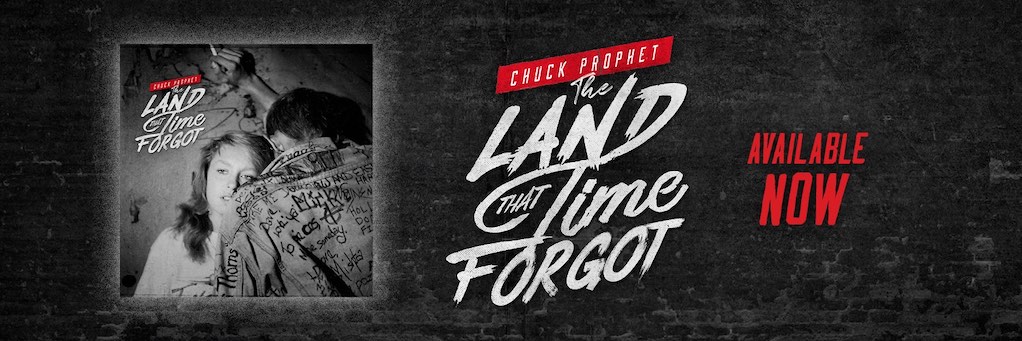

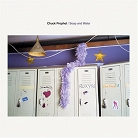
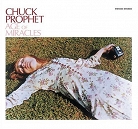
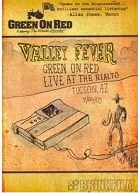
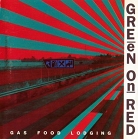



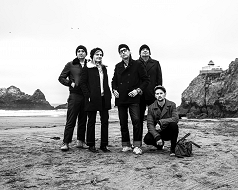
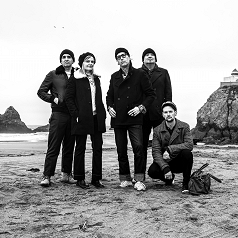
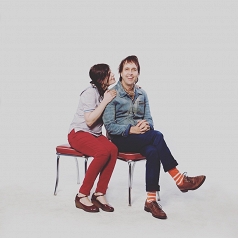
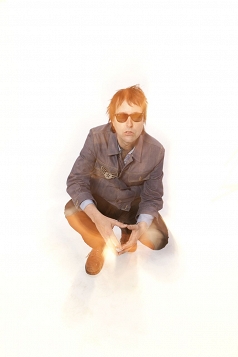

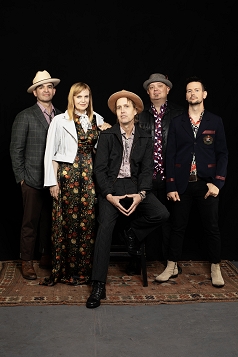
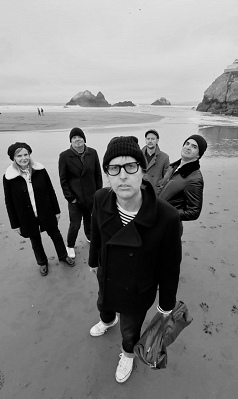
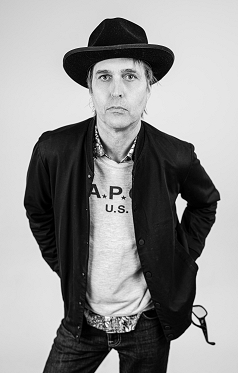
3_238_159auto_s_c1.jpeg)
